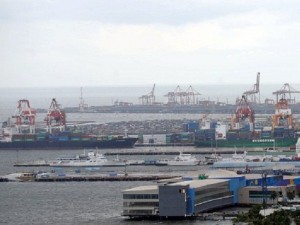Export growth slumped to 4.2% in June
Philippine exports grew by only 4.2 percent in June after a double-digit rebound in May.
The National Statistics Office (NSO) on Friday reported that exports for the month reached $4.31 billion, with electronics shipments dipping 14.6 percent to $1.89 billion.
Total exports in the first half of 2012 rose 7.7 percent to $26.75 billion from $24.85 billion in the same period last year.
Shipments to Japan, the country’s top exports market in June, decreased 24.7 percent after registering an annual gain of 81.5 percent the previous month due to downward adjustment in purchases.
Exports to East Asia, the top export destination by economic bloc, fell 5.4 percent from a year earlier, after a 25.6-percent annual climb in May, and exports to Asean member-countries saw a 6.4-percent drop in June. Other top buyers of Philippine products in June were the United States with $674.21 million, and China with $534.63 million.
“It’s back to reality. The initial euphoria brought by a 19.7-percent increase in exports [in May] has been dashed back to more realistic level in June,” said former budget secretary Benjamin Diokno, who now teaches at the University of the Philippines School of Economics.
Diokno said the lackluster performance of exports could be offset by increased manufacturing for the domestic market.
“[However], this is easier said than done given the continuing appreciation of the peso. It is cheaper to import than manufacture goods for the domestic market. At the same time, it is more difficult to export as the peso appreciates in value,” Diokno said.
Cid Terosa of the University of Asia and the Pacific said that electronics sector would not fully recover in the second half because of continuing lethargy in major export markets but said that the 10 percent growth target for exports could still be achieved if non-tradi tional items would continue their good performance.
The central bank sought to play down the risks to the broader economy, saying domestic demand should offset external weakness.
Analysts were of the view that the drop in exports, dominated by electronics and semiconductors, increased the chances of a rate cut as the central bank tries to shield the economy from slower global growth.
The Aquino administration is targeting a higher growth of 5 to 6 percent this year from 3.9 percent in 2011 and Bangko Sentral Deputy Governor Diwa Guinigundo said the goal remained “realistic and achievable” despite the export sector’s lackluster performance. “Growth will depend more on domestic demand to sustain traction.”
Domestic demand would be underpinned by benign inflation and robust remittances from Filipinos overseas and that should support the economy amid the global economic turmoil, he said.
The Philippine economy expanded at a faster-than-expected 6.4-percent annual pace in the first quarter, helped in part by a rebound in exports during the period, but the latest data suggested it was losing some of the momentum.

